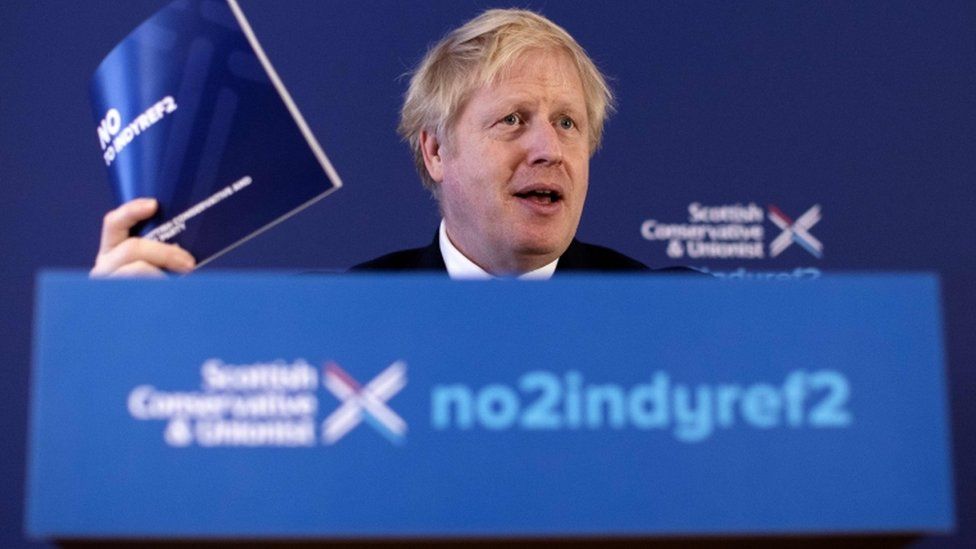Scottish independence: Boris Johnson to 'carefully consider' indyref2 request
- Published
- comments

The prime minister will give "careful consideration" to Nicola Sturgeon's request to be handed the powers to hold a second independence referendum, the Scottish secretary has insisted.
Alister Jack said the UK government would formally reply to the first minister's request in the new year.
But he said 55% of Scottish voters had backed parties that are opposed to independence in last week's election.
Ms Sturgeon says she wants to hold a referendum next year.
She wants the UK government to agree to a so-called section 30 order, which would give the Scottish Parliament the power to hold a referendum and put its legality beyond doubt - as happened ahead of the 2014 referendum when Scotland voted to remain in the UK by 55% to 45%.
Ms Sturgeon sent documents to Prime Minister Boris Johnson on Thursday outlining her case for indyref2, arguing that she now has an "unarguable" mandate after her SNP won 48 of Scotland's 59 seats in last week's general election.
She has warned Mr Johnson that a "flat no" to her request - which is widely expected to be his response - will not be the end of the matter, and has predicted that the prime minister will eventually have no choice but to agree to her request.
But she has also ruled out holding an unofficial referendum similar to the one in Catalonia two years ago, arguing that it would not lead to independence.
In her letter to the prime minister, Ms Sturgeon said he had a "duty" to respond in a "considered and reasonable manner", adding: "I therefore look forward to discussing matters further with you in the new year."
Speaking to the BBC's Good Morning Scotland programme on Friday, Mr Jack said the prime minister would not mark Ms Sturgeon's letter with "return to sender" - as he has previously pledged he would.
He added: "He has received a letter and he is going to give it careful consideration, and will reply in the new year.
"The result of the general election was that 55% of the votes cast were cast for parties that backed the union - 45% were for separatist parties and that's no different to what happened five years ago, in 2014.
"The desire to support separatist parties has not increased over five years and for that reason we believe that the numbers dictate Scotland should remain part of the United Kingdom and we should look after the people, the majority of people, who democratically cast their votes to stay part of the United Kingdom."
The Scottish secretary said both Ms Sturgeon and her predecessor Alex Salmond had signed an agreement pledging to respect the result ahead of the 2014 independence referendum, and had gone on to talk about that vote being a "once in a generation" event during the campaign.
And he suggested that his opposition to another referendum would not change even if the SNP wins a majority at the next Scottish Parliament election in 2021.
Mr Jack said: "I don't believe that it's a democratic mandate because the Scottish people decided in 2014 and that was only five years ago.
"We're coming out of the European Union, we've got an optimistic future in front of us, we need to all be in the rowing boat together pulling on the same oars, doing trade deals, improving our position in the world economically, and benefiting from one United Kingdom."
Asked about opinion polls that have suggested an increase in support for independence, he said: "I don't believe spikes or single polls or a one-off election should be allowed to undermine an enduring and strong union that hugely benefits Scotland in the United Kingdom.
"To wrench the UK apart, you need to see a long-term position at 60%. You don't need to see a single one-off election, no."
Analysis by Glenn Campbell, BBC Scotland chief political correspondent
The Conservative's opposition to another independence referendum was clear in the election campaign — "no to indyref2" was emblazoned across their Scottish manifesto.
In government, both Boris Johnson and Michael Gove have said the concept of the 2014 referendum as a "once in a generation" experience should be respected.
However, they have left themselves some room for manoeuvre.
There is next to no chance of them agreeing to a vote next year - but they have not adopted a position set in stone for the five year term of the UK parliament.
Why? Because as Alister Jack pointed out last month, there are Holyrood elections in 2021 which could influence their thinking.
If the SNP win an outright majority - as they did in 2011 - having promised another independence vote, it would be difficult for UK ministers to ignore.
The same may be true if the SNP and Greens form a combined pro-independence majority, although there would be an argument about that.
The Conservatives will campaign hard to avoid these outcomes and we've yet to see what they'll offer Scotland in an effort to persuade voters to stick with the UK.
But ultimately, as the former Tory cabinet minister Andrew Mitchell said this week, calls for indyref2 cannot be put off forever if Scotland keeps backing the SNP.